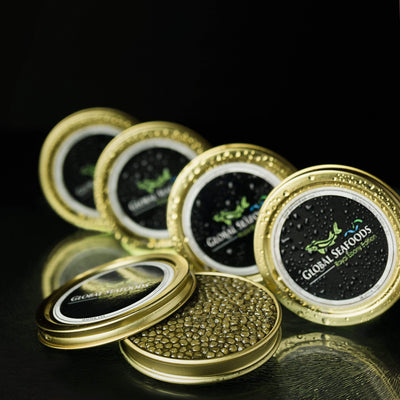Sturgeon Caviar: History, Types, and Why It’s the World’s Ultimate Luxury

Sturgeon Caviar: A History Flavor
Few foods evoke luxury and indulgence quite like Sturgeon Caviar. Known as “black gold,” this delicacy has captivated palates for centuries, symbolizing wealth, sophistication, and exclusivity. From its humble beginnings as a source of sustenance to its modern-day reputation as the epitome of fine dining, sturgeon caviar continues to reign supreme in culinary circles.
This guide explores the fascinating history of sturgeon caviar, its types, cultural significance, and why it holds such a revered place in global cuisine.
What is Sturgeon Caviar?
Sturgeon caviar is roe, or fish eggs, harvested from sturgeon species. Unlike roe from other fish, true caviar exclusively comes from sturgeon, making it both rare and highly coveted.
Key Sturgeon Caviar Varieties
- Beluga Caviar: Known for its large pearls and creamy, buttery texture, Beluga is the gold standard of sturgeon caviar.
- Ossetra Caviar: Medium-sized pearls with a nutty, robust flavor make Ossetra a favorite among connoisseurs.
- Sevruga Caviar: Smaller grains with a bold, briny taste, Sevruga is prized for its intensity.
Did You Know? Sturgeon are prehistoric fish, dating back over 200 million years, making them one of the oldest species still thriving today.
Explore premium options here:
The Origins of Sturgeon Caviar
The history of sturgeon caviar dates back thousands of years, with its roots firmly planted in the Caspian and Black Seas.
Ancient Persia: The Birthplace of Caviar
The word “caviar” originates from the Persian term khaviar, meaning “egg-bearing.” Persians were the first to recognize the nutritional and culinary value of sturgeon roe, considering it a source of strength and vitality.
Caviar in Greek and Roman Cultures
Caviar reached Europe via trade routes, where it quickly gained a reputation as a delicacy among the elite. Roman poet Martial called it “food for the gods,” served at lavish banquets alongside other luxury items.
Russia: The Epicenter of Sturgeon Caviar
By the 13th century, Russia had become synonymous with sturgeon caviar production, thanks to the abundance of sturgeon in the Caspian Sea.
A Royal Delicacy
Caviar was a staple at the tables of Russian tsars, who served it as a symbol of wealth and prestige. Its pairing with vodka, a tradition still cherished today, enhanced its flavors and cemented its place in Russian culture.
Pro Tip: Enjoy your sturgeon caviar like Russian royalty—pair it with chilled vodka for a traditional tasting experience.
Watch more about caviar traditions on our Global Seafoods YouTube Channel.
Modern Production and Sustainability
Today, sustainable farming practices ensure the availability of sturgeon caviar while protecting endangered wild populations.
The Decline of Wild Sturgeon
Overfishing and habitat destruction have placed many sturgeon species on the brink of extinction. According to the World Wildlife Fund (WWF), 85% of sturgeon species are critically endangered.
Sustainable Caviar Farming
Countries like Italy, China, and the U.S. lead in farmed caviar production, creating high-quality options without depleting natural stocks.
Discover our selection of sustainably sourced caviar:
The Cultural Significance of Sturgeon Caviar
A Culinary Icon
Sturgeon caviar has been a symbol of luxury across cultures, from Russian aristocracy to modern Michelin-starred restaurants. Its complex flavors, ranging from briny and bold to creamy and nutty, make it a versatile ingredient in high-end cuisine.
A Symbol of Celebration
Caviar graces the tables of weddings, holidays, and upscale gatherings. Its presence signifies abundance, elegance, and refinement.
Famous Pairings:
- Champagne
- Dry white wine
- Blinis with crème fraîche
Explore caviar recipes and pairings on our YouTube Channel.
How to Enjoy Sturgeon Caviar
1. Serve It Simply
To appreciate the full complexity of its flavors, serve caviar on a neutral base like blinis or toast points.
2. Use the Right Utensils
Always use a mother-of-pearl or plastic spoon to avoid altering the caviar’s flavor.
3. Pair It Perfectly
Pair caviar with sparkling wine or vodka to enhance its briny and creamy notes.
Common Misconceptions About Sturgeon Caviar
- Caviar Is Only for the Wealthy: While premium varieties like Beluga are expensive, there are affordable options such as Paddlefish Caviar.
- All Caviar Tastes the Same: Each species offers distinct flavors, textures, and culinary applications.
Where to Buy Premium Sturgeon Caviar
If you’re looking for authentic, high-quality sturgeon caviar, Global Seafoods offers a range of options to suit every palate:
The Legacy of Sturgeon Caviar
The story of sturgeon caviar is one of enduring appeal and evolution. From ancient Persian royalty to modern gourmands, its legacy continues to captivate the culinary world. With sustainable farming practices and innovative culinary applications, sturgeon caviar remains the ultimate indulgence.
Ready to indulge in the luxury of sturgeon caviar? Explore our collection and discover why this delicacy has stood the test of time.
Also in News

How to Make Sea Bream Sushi With Dry-Aged Tuna & Crab Roll — Step-by-Step With Chef Joshua
A complete guide to making Sea Bream sushi at home, including filleting, curing, slicing, and building a Dry-Aged Tuna & Crab sushi roll. Chef Joshua shares professional tips for restaurant-quality results.

Cooked Crab for Game Night: Everything You Need for a Perfect Seafood Party
Take your game night to the next level with a Cooked crab party. Learn the best recipes, cooking tips, and hosting hacks for a memorable seafood feast.

Steam Crab for Date Night: A Romantic Guide to the Perfect Seafood Feast
Make your next date night unforgettable with a romantic Steam crab experience. This guide covers everything you need to know, from ambiance to the best crab varieties.

